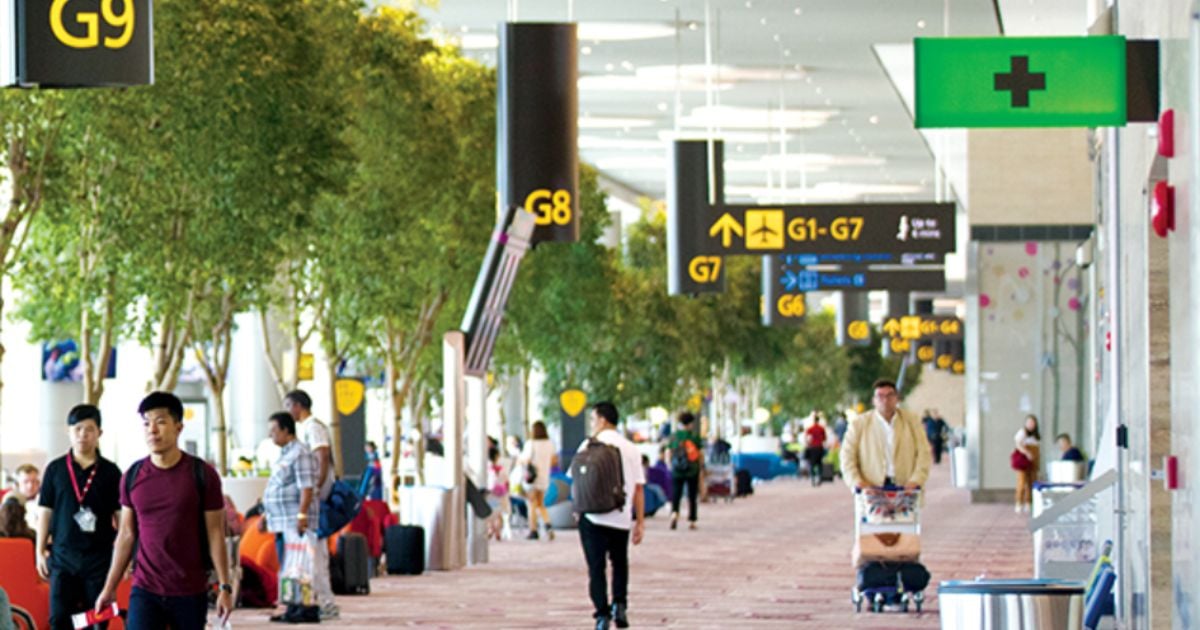Automated lanes have made immigration clearance much smoother since they were introduced in Changi Airport. Taking less than a minute to clear one person, the automated lanes have been major time-savers for users.
Previously, these lanes could only be used by Singapore residents and passport holders from 60 jurisdictions.
However, these lanes were opened to all foreigners arriving in Singapore in early May. Since then, all foreigners arriving here, regardless of nationality, can use the automated lanes at Changi Airport to clear immigration.
No registration is required to use these, allowing even first-time visitors to Singapore to use the automated lanes.
The decision to allow all foreigners to use these lanes is part of the Immigration and Checkpoints Authority’s (ICA) new clearance concept that was announced in 2019, which aims to provide faster and more secure immigration clearance.
Last year, more than 160 automated lanes were installed. Another 230 lanes will be set up this year. ICA intends to have about 800 automated lanes across all of Singapore’s checkpoints by 2026.
Passport? Or No Passport?
Arrival: Passport Required For Foreigners
Note that these automated lanes are not the same as the contactless Automated Border Control System (ABCS) we have talked about before.
The automated lanes that all foreign visitors can now use to enter Singapore refer to those where you first scan your passport before your biometrics are read (automated clearance).
This is different from the ABCS that will be in use by the end of this year, which will not require a passport (contactless clearance).
Departure: No Passport Required For Everyone
The ABCS does not require one to present a passport. The system will only need to scan a traveller’s face and irises to clear him or her.
Together with automated clearance, contactless clearance will help to “reduce immigration clearance time at passenger halls by about 40%,” said ICA during its annual Workplan Seminar on 17 May 2024.
As of March 2024, about 600 ABCS have been installed.
The Bottom Line
To put things simply, here’s what to expect by the end of 2024.
For Singapore residents, you will not need to present your passport* when you leave Singapore or arrive back from another country.
For foreign visitors, you will need to present your passport to use the automated lanes to enter Singapore. When you leave Singapore, however, you will not need to present your passport* again.
*Passport-free clearance applies for immigration clearance at Changi Airport, Seletar Airport, and Marina Bay Cruise Centre Singapore.
Among the First In the World to Introduce Passport-Free Immigration Clearance
ICA held its annual workplan seminar on 17 May at the Marina Bay Sands convention centre with the theme: Redefining Border Clearance and Service Delivery.
Minister of State for Home Affairs Muhammad Faishal Ibrahim, who was the guest of honour at the event, said Singapore will be among the first in the world to introduce passport-free immigration clearance.
He said technology has played a critical role in ICA’s transformation efforts.
ICA’s efforts in providing “world-class service” to travellers have been recognised globally, with Changi Airport being named the best in the world for its immigration services in the World Airport Survey 2024, the authority said.
The award was given by Skytrax, the international air transport rating organisation, on 17 April 2024.
Automated Clearance At Land Checkpoints
For those travelling by car, automated clearance is also available at Singapore’s land checkpoints via the Automated Passenger Clearance System (APCS), which allows car travellers to perform self-clearance while remaining in their vehicles.
Car travellers are now able to clear immigration by scanning a pre-created QR code via the MyICA mobile application.
On arrival at the checkpoint, travellers can self-scan the QR code at the car counter via contactless scanners without having to present their passports to the immigration officer.
Full Automation to Come Soon
Full automation of car clearance will be achieved at Tuas Checkpoint from 2026, and at the redeveloped Woodlands Checkpoint from 2028.
After scanning the QR code, travellers will have to present their biometrics for identity verification via contactless biometric scanners.
Once fully automated, there will no longer be a need for ICA officers to man individual clearance counters, allowing ICA to open more lanes around the clock.
So if you suddenly want to go for supper in JB at 12am, don’t worry about having to fight with others for limited open lanes.
ICA aims to provide a fuss-free experience for customers by utilising technology.
Today, nearly 95% of ICA’s services have gone digital, and 95% of customers submit their applications through ICA’s website or via the MyICA mobile application.
The new ICA Services Centre (ISC), located next to the existing ICA Building in Lavender, is expected to be operational next year.
ICA’s various services centres will be reorganised into one integrated Services Centre, with a single counter being able to provide the whole range of services covering passport matters to immigration passes.
The ISC will also see the introduction of the Integrated Smart Document Management System (iSMART), which will enable customers to self-collect identity cards and passports without the need for an appointment.
Leveraging biometrics and robotics, iSMART is an end-to-end solution that offers convenience.
